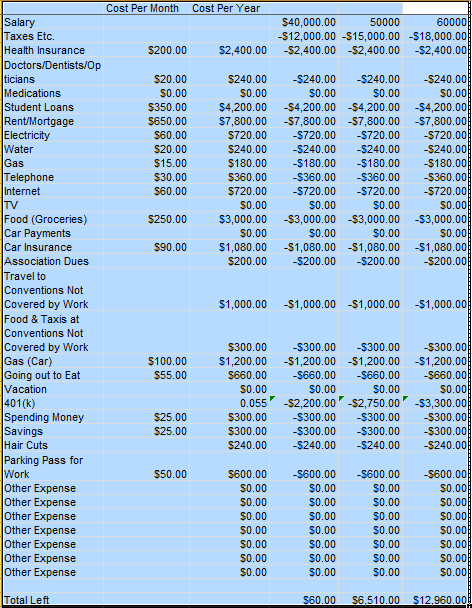One of the most important things to consider when evaluating a job offer is the cost of moving to the location and the local cost of living once you arrive. For some company’s and many institutions of higher education some sort of moving allowance is provided. I’ll address the cost of moving in a later post, but for today I’d like to look at the day to day costs of living.
For the purposes of comparison I’ve attached below one fake set of living expenses (my expenses are higher and I am married) for a year and it shows how much money is left over at three different salary levels.
Here’s some things to consider if you decide to do your own comparison:
Don’t estimate for the cheapest places to live in a new area, you’ll probably want to live somewhere nicer, people who are single may be able to save money by renting a room but don’t count on being able to find one initially if you have a short amount of time from hire to start date.
Remember that the cost of health insurance, 401(k) contributions, and many other costs will vary greatly from one work place to another so be sure and input all your expenses for an accurate comparison.
Please note that for the 401(k) / retirement contribution line the cost per year cell is actually showing the % income being save, in this case 5.5% which is equal to 0.055. If you wanted to save 8% per year you would change the number to 0.08.
If you haven’t rented by yourself before please note that the numbers used in my estimate for utilities are a bit low for many months of the year, I just adjusted the numbers till the $40,000 column had a positive number of dollars left over.
Please do not mess with the taxes etc. column, it isn’t 100% accurate but it’s a decent estimate of combined government with holdings.
If you are married or single and have a child your health insurance may be more, if you are single it may be less. Be sure and count any annual shots or physicals, specialist visits, mammograms or colonoscopes, allergy shots, daily or seasonal medications, and of course allow for the possibility that you just might get sick once or twice in a new area. Don’t forget dentists, teeth cleaning, and eye doctors and glasses / contacts.
For car expenses remember gas, oil lube and filter changes, tires, insurances, maintenance, windshield wiper fluid, oil, and any ongoing or potential maintenance costs.
If you haven’t been attending conferences consider this a reality check, most major conferences run for $120-$1000 just for registration. Add in plane fare $300-$600 if you book it at a good time, and a hotel room, usually about $200-$250 per night for larger conferences and you can be looking at a hefty bill before you even pay for you food, cabs around town, and transportation to and from the airport. Depending on which conferences you need to attend even a hefty stipend may not go far, and some places don’t provide any support for conferences (which should be a huge red flag in my opinion since I have yet to hear of a library that doesn’t require conference attendance.)
And of course you need to budget for things like clothing, especially if you are moving to a different climate, shoes, undergarments (these do wear out, if you buy a few new every year you can avoid having everything fall apart at the same time and spread the cost out over time.)
If you are married don’t forget to put in your spouses expenses, especially if they don’t have a job waiting for them, you never know if they will find a job immediately or a year from when you move so plan to live without their income.
Be realistic and admit that you are going to end up spending money at restaurants and coffee shops. Even though I don’t frequent these places a lot on my own I have had many very important meetings over lunch or a cup of coffee so budget for these events accordingly on top of money to go out with your family/friends, etc.
There are some empty columns at the bottom you can fill in if you download the file or Google Spreadsheet.
Please, please please check your costs of living before you accept!

To play with your own numbers feel free to download a copy of the Excel file or click the link to the Public Google Document and save your own Google Spreadsheet to play with.
XLS Estimated Cost of Living File (Excel File to Download)
Google Spreadsheet Estimated Cost of Living File (Web Page, I recommend downloading your own copy in whatever format works best or saving a private copy to your Google Account.)
Remember, if you can’t afford to pay for all of your monthly expenses on the salary you are being offered you will either need to: find a secondary income, cut your expenses, or think about refusing the job.

